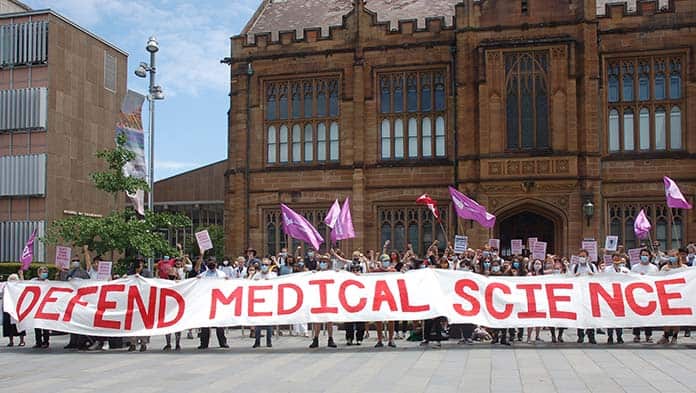Academics in the School of Medical Sciences (SoMS) at Sydney Uni staged an “Afternoon of Action” on Wednesday in protest against forced redundancies in the School. The “spill and fill” change process will see the restructuring of teaching and research in Physiology and Pathology, with 43 staff members sacked and forced to compete for a reduced 27 positions, a reduction of 37 per cent.
Twenty academics out of 30 in Physiology left work for the afternoon to attend the protest. They were supported by SoMS colleagues in Anatomy, Mortuary and Pathology as well as contingents from the Casuals Network and staff in the Arts and Social Sciences. Eight professional staff from Engineering also came to the protest because of the union email, telling Solidarity that, “we’re here because it could be us next”.
There was also an impressive turnout of over 100 students, for a protest held in the last week of a semester in which most students studied almost entirely online. As Meloni Muir, the protest’s chair, quipped, “The police have been on the campus this semester more often than some students!”
There is no doubt amongst academics that these two Disciplines are the first on the chopping block, with more restructures and job cuts in SoMS expected.
NTEU University of Sydney Branch President Kurt Iverson told the rally, “There is a deliberate and co-ordinated set of cuts that are going on across this campus, all being justified in the name of the pandemic.”
A statement read out by Emeritus Professor John Hearn savaged the new culture of managerialism in the Faculty of Medicine and Health at the University of Sydney, saying, “The last two years has seen a disgraceful destruction of a famous School by an imported group of mercenaries who care nothing for the university, history, team or achievements.”
Organising the fightback
The action was the best example this year so far of staff taking action to oppose job cuts at the university.
Despite intense anger at management and the cuts in SoMS, organising a campaign of public protest did not come automatically. Initially some staff wanted a media-only campaign.
Organising began when a group of four academics and four students met on 30 October, outside official union structures, and reached out to 25 SoMS academics and supportive members of the NTEU Branch Committee. This cohered an email list and in-person meetings involving a majority of affected academics.
Academics launched the Defend Medical Science Campaign only one week before the protest.
The “Afternoon of Action” was originally billed as a “walk out” from work. A teach in was organised following the 1pm protest to allow academics who had stopped work to continue their action all afternoon and not return to their offices.
The 18 academics at the campaign launch on Wednesday 11 October unanimously agreed to the walk out.
However the NTEU Branch raised concerns that describing the action this way meant organising unprotected and unlawful industrial action, risking fines under workplace laws.
This is a crucial debate, with the fear of fines paralysing the union from taking any effective action against the thousands of job cuts across the sector. It is not enough to wait until the possibility of lawful action during the union’s bargaining round next year—by then many jobs will already be lost.
But the NTEU branch committee was unwilling to endorse the idea of a walk out, or to open the discussion to a wider members’ meeting before the action. Disappointingly, NTEU Fightback members opposed calling a members’ meeting and sided with conservative opposition from the branch president to calling the action a “walk out”.
In response, the Medical Science academics agreed to change the wording of the action – although not its substance – in order to gain union backing.
This was the right decision. Union support strengthened the action, meaning it was advertised to all NTEU members on campus. Most importantly, it gave more SoMS academics confidence to come out of work.
To successfully stage unprotected industrial action, union activists still have a job ahead of them to win majority support in the University of Sydney NTEU branch. But the SoMS protest shows that action including cancelling classes and walking off work for the afternoon is possible. This is an important lesson for staff across the whole university sector.
Solidarity members initiated the “Afternoon of Action”. This struggle can act as a springboard for future actions and escalations against cuts at universities. NTEU members need to fight and take militant action – including unprotected industrial action when needed. This kind of action now is the best preparation for when the bargaining period opens next year and protected industrial action is possible.
By Kelton Muir






